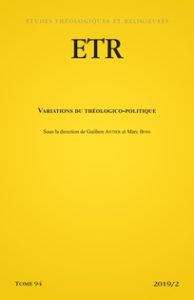Comment nommer un sujet politique et réinventer le commun face aux tentations identitaires et aux logiques de désubjectivation ? Lisant l’épisode biblique de la rencontre entre Jésus et la Cananéenne dans le premier Évangile (Mt 15,21-28), Guilhen Antier se demande si un nom injurieux peut constituer le point de départ d’une invention poétique susceptible de changer une situation politique. La lecture mobilise successivement la distinction établie par Jacques Rancière entre politique et police, la théorisation psychanalytique du signifiant selon Jacques Lacan et la théopoétique de l’événement de John Caputo.
Crumbs for Dogs (Mt 15,21-28) or How to Play Theopoetically with the Police
How is it possible to give a name to a political subject and reinvent the commons, in the face of the temptation to adopt identity politics and of the logic of unsubjectivation? Reading the biblical encounter between Jesus and the Canaanite woman (Mt 15,21-28), the author wonders whether an offensive name may constitute a starting point for poetical invention, likely to change a politicial situation. In his reading of the text, the author builds upon Jacques Rancière’s distinction between politics and the police, Jacques Lacan’s psychoanalytical theorisation of the signifier and John Caputo’s theopoetics of the event.
p. 313-336
Auteur
ANTIER Guilhen
Guilhen ANTIER, docteur en théologie et en études psychanalytiques, est maître de conférences en théologie systématique à l’Institut protestant de théologie, Faculté de Montpellier, membre du Centre de recherches interdisciplinaires en sciences humaines et sociales (CRISES – EA 4424).
